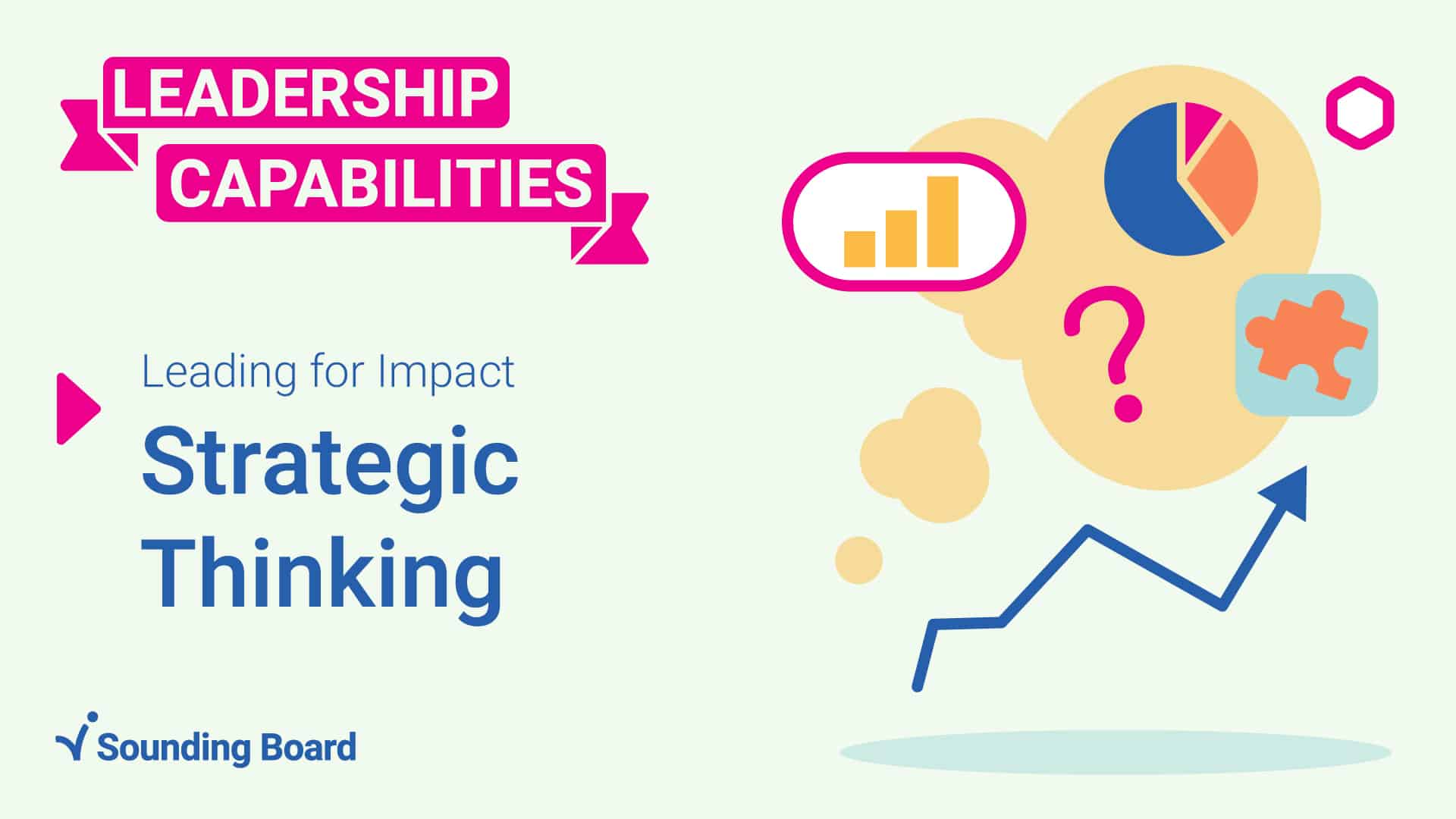This blog is part of a 16-part series focused on what capabilities make a strong leader. Sounding Board has identified 16 leadership capabilities that the strongest leaders possess. These were developed from research-backed leadership theories, leadership competencies used for evaluation from top business schools, and 25+ years of practical coaching application.
Top performers in an organization often share similar characteristics: They’re hard-working, devoted, creative, timely, organized, technologically adept, and work well with others. In other words, they do everything they’re supposed to and then some, yet they may not be in a leadership position. So, what are they missing? If skills and performance aren’t the answer, they may not be consistently demonstrating skills as a strategic thinker.
These days, strategic thinking skills are one of the most sought-after leadership capabilities when it comes to excelling in so many facets of business operations, and HR and talent management. Whether a leader is recruiting new talent, managing a project, or helping to develop other high potential or emerging leaders and prep them for the next stage in their careers, strategic thinking has considerable merit. It’s also a difficult skill to come by, perhaps because it can easily be misunderstood.
What is strategic thinking?
With things changing so rapidly in the global marketplace, the business landscape is more volatile than it has ever been. So, leaders must be prepared for anything and everything. That’s why strategic leadership is so invaluable. It enables someone to look at the big picture, which includes ideation to not only get ahead of potential problems and roadblocks — and implement fail safe processes where needed — but to see opportunities, and pivot where it would be most advantageous for an organization.
Strategic thinking is a long-term process that allows leaders and their teams to realize their goals. Leaders who think strategically are conscientious and deliberate about not only their decisions in the present moment, but also their plans to shape the future of their teams and organizations. They aren’t simply dreamers; they’re visionaries with actionable plans, who anticipate challenges and market shifts before they happen. That’s what sets great strategic leaders apart.
The business case for strategic leadership
With so much on a leader’s plate, it’s undoubtedly easier to make short-term plays that provide returns in the moment, or to put out the little fires that come up without thinking too far ahead. But for many organizations, this can lead to significant long-term losses in the form of missed opportunities, inefficiencies, or ineffective prioritization.
Conversely, leaders who can think strategically are almost always prepared. They have keen insight and often actionable knowledge about what makes their organizations vulnerable, what opportunities are best to capitalize on, and how to forecast the most relevant market trends. Further, while they have plans for the future, they are almost always able to adapt based on new information.
While some of these characteristics might seem innate, there are skills that new and current leaders can develop to help themselves think and plan more strategically, and further cement their indispensability to their teams and to their organizations.
Key strategic thinking skills for leaders
Strategic thinkers embody skills that enable them to solve difficult problems, plan ahead, and realize their visions for an organization’s future. Some of the strategic skills that all leaders can develop with practice include:
- Developing a vision: Strategic leadership is about coming up with a vision that can then be executed using the resources available. This involves analyzing present data and market conditions, asking questions, gathering intelligence, anticipating hiccups, and creating a plan from which to move forward. This step need not be done alone. Leaders have teams and other leaders at their disposal for brainstorming, and the more savvy ones will not hesitate to leverage internal or external suggestions, feedback, and ideas.
- Communicating effectively: Strategic thinking can only take a leader as far as they are able to confidently communicate their plans to others. Powerful communicators are confident when relaying their plans, but they also maintain a two-way line of communication. They understand that communicating is as much about conveying their own ideas as it is about listening to others.
- Setting goals and delegating tasks: With a vision and proper communication channels, the next step is to set collective goals, and to be clear on everyone’s roles within the strategic mission. Leaders must be adept at delegating tasks because even the best laid plans are easier to realize with the help of a team.
- Continuously gathering intelligence: Things are always changing. Strategic plans should as well. Gathering market data on what’s working and what isn’t should be an on-going process so that leaders never miss a thing. Far from being set in stone, strategic plans — and the leaders who build and nurture them — must be adaptable so that leaders can continually analyze data and trends as they present, anticipate future scenarios, and operate using the latest information.
- Inviting feedback: Like gathering external intel, it’s important for strategic leaders to continuously solicit feedback from their own people, especially when it comes to making tweaks and improvements to the vision. Promoting knowledge sharing from diverse viewpoints in the workplace often leads to greater innovation. It follows then that for strategic leaders, it’s not only relevant but immensely important to obtain feedback as they actualize their plans.
Consider leadership coaching to learn how to think strategically
By making a few simple shifts in thinking and processes, current and emerging leaders can become more strategic, and help their organizations gain a competitive edge. Focusing on visionary thinking, communication, goal-setting, data analysis, and how to give great feedback can help leaders establish adaptable plans that result in organizational wins.
Inevitably, putting new skills into practice may seem challenging. That’s where leadership coaching can help. At Sounding Board, our certified coaches are highly trained to help equip leaders with the tools they need to think and act more strategically, and to use their insight and knowledge to lead companies and people better. Request a demo from Sounding Board today.











